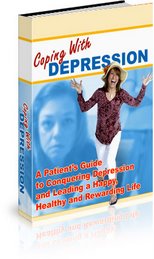Faye B. Roberts
One in ten women suffer from Postpartum Depression after childbirth. The effects of can be very severe. Postpartum depression is not the same as having baby blues, which is a typical reaction to child birth. The symptoms of Postpartum depression include:
# Sluggishness
# Fatigue
# Exhaustion
# Feelings of hopelessness or depression
# Disturbances with appetite and sleep
# Confusion
# Uncontrollable crying
# Lack of interest in the baby
# Fear of harming the baby or oneself
# Mood swings
Studies clearly show that the effects of Postpartum depression are an indication of the risk factors for a child's intellectual, social, and cognitive development. Infants as young as three months of age are able to detect the moods displayed by their mothers and modify their own moods in response. It also can have long lasting, traumatic effects on a woman's confidence in herself as a mother, which in turn can effect her parenting skills.
Children whose mothers suffered postpartum depression after childbirth face a greater risk of violent behavior by the time they reach the age of 11. The violent behavior among such children is especially high if their mothers suffered repeated bouts of depression. Compared to their peers,these children have more diverse and severe aggressive behavior. Male children are more prone to violent behavior than female children.
The link between a child's violent behavior and the mother's postpartum depression is associated with the children's problems in regulating their attention and emotions. Their cognitive skills, expressive language development and their attention span difficulties have been adversely affected by maternal depression.
There is little biological basis identifiable for postpartum depression. The occurance may be increased in certain risk groups including women with a previous history of depressive disorder, complications during delivery, and some other obstetric factors. Some of the psychological stressors consistently associated with postpartum depression include unemployment, marital conflict and lack of personal support from family and friends. But here again, the strongest association appears to be with women who have suffered previous depression.
These findings emphasize the importance of early detection and treatment of postpartum depression by family physicians. A woman's level of exhaustion and irritability when her infant is two weeks old and nursing frequently may not be normal when her baby is four months old and sleeping soundly through the night. The intensity and degree of a woman's coping response may also indicate a pathologic state. Loss of energy and diminished concentration are frequently the result of sleep deprivation. However, for a postpartum woman to have no energy or to have such difficulty in concentrating that she frequently loses her train of thought or has considerable difficulty making decisions is not normal.The effects of postpartum depression can cause significant problems in both mothers and fathers in the United States.
---------------------------------------------------------------------------------
Faye B. Roberts is an independent researcher and author on depression and is assisting others in their quest to understand this serious illness. Discover a new way of thinking and coping with depression that will change the way you look, feel and live your life. Visit Facts On Depression
Thursday, June 7, 2007
Subscribe to:
Post Comments (Atom)



No comments:
Post a Comment